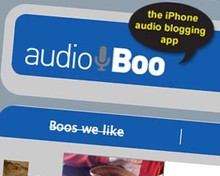
The following week users uploading G20 boos nearly toppled the site, while Guardian journalist Matthew Weaver's clips were embedded in articles and as an audio map.
While the application is still only available on the iPhone, individual reporters, hyperlocal and international news organisations are experimenting with it as tool for news reporting and marketing.
Below Journalism.co.uk takes a look at how writers and journalists are using Audioboo, their experiences and how it can be developed.
The individual
There are some great examples of individual writers, journalists and independent news sites using Audioboo.
Community site London-Se1.co.uk has used the app to upload audio of breaking news events, with editor James Hatts describing the tool as having the 'idiot-proof brilliance' of the Flip camera.
Meanwhile micro news site Towcester News has started experimenting with the app - including this short interview with Formula One commentary legend Murray Walker.
"The beauty of the medium is the brevity," editor of the Onion Bag Blog, Jason Cobb, tells Journalism.co.uk.
"Limiting the length of a boo to five minutes is good as well. If anything, this is perhaps too long.
"Videoboo is of course just around the corner. I think I will stick with audio though. There's a sense that this is a much purer form of broadcasting. You have to really think about the point you want to put across, rather than just let a camera do the job for you."
Twitter integration helps promote content, while an RSS feed of uploads to your account means you can easily upload them as podcasts to the iTunes store, says Cobb.
But Cobb's not keen on the new 'thumbs up/thumbs down feature': "It's not a vanity contest and I think this may discourage new users."
The radio station
Broadcast journalist Steven Phillips is responsible for getting BBC London 94.9fm onto Audioboo and, he admits, for making presenter Tony Blackburn a fan of the site.
Because of its audio focus, the site is an ideal way for radio stations to promote themselves, Phillips told Journalism.co.uk.
"It's also enabled us to promote shows virally and it gets linked to your Twitter account. We're starting to get responses to our Audioboos out there," he says.
"It's still very much behind Twitter, but we haven't even promoted it on air yet. Once it starts to filter through I think it will be a very useful tool for bits you can't get anywhere else."
The station has experimented with uploading a range of audio content to the site from presenters reading the headlines to question and answer sessions with news editors about what's on the news agenda.
It's also testing out formats that could be described as 'micro-programmes': interviews with presenters call 'In A Minute'. The aim of using Audioboo is to both promote content from BBC London and offer behind-the-scenes information to listeners.
The BBC's editorial guidelines and its accountability to the licence fee payer have to be considered when experimenting with the tool, adds Phillips. For example, the station has scaled back on uploading news headlines so as not to repeat the BBC website's listen again feature for radio.
The tool is a useful add-on - particularly since its link-up with Twitter, he says, but it's an experiment for now and if new technologies are developed the station won't restrict itself to just using one site.
The newspaper
Stephanie Romanski, web editor of Nebraska's Grand Island Independent, says it was the simplicity of the tool that made her think the newspaper could use it.
"Including audio with stories is something that's always been rather tricky and time-consuming to code and do but Audioboo makes it a cinch. Like with Twitter, we're kind of learning that there is beauty in simplicity," she tells Journalism.co.uk.
Currently only Romanski and a senior columnist from the paper are using it, but it has could be used for quick updates from breaking stories, upcoming headlines and quick interviews, she says.
There's also potential for promoting other online content, such as the paper's CoveritLive chats with staff members.
To make the service easier for users features for handling multiple accounts, storing boos for uploading later and a counter showing how many times a boo has been played, would be useful, says Romanski.
Allowing listeners to comment on others' boos via the iPhone application would also be beneficial, she says.
Free daily newsletter
If you like our news and feature articles, you can sign up to receive our free daily (Mon-Fri) email newsletter (mobile friendly).
Related articles
- Three free AI-powered transcription tools for journalists
- 38 mojo apps from BBC trainer Marc Blank-Settle
- What will be the lasting legacy of the pandemic on the digital media world?
- Audio, the least stressful medium for news? Yes and no
- James Hewes, CEO of FIPP, on the legacy of the pandemic on digital media









